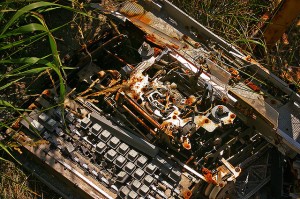Hey everyone, spend some time this weekend looking over this article just released by the Economist. The author addresses the popularity of e-books, and ways the publishing industry should change in order address the way books are transforming with new technology. Somewhere they mention that publishing houses are still important, but personally I don’t think they make a strong case. However, it’s interesting to consider the implications that Amazon has taken over the digital book publishing industry much in the same way Apple took over music downloading and Netflix seems to have a lockdown on streaming movies.
What does it mean for there to be this sort of monopoly on e-book distribution? It reminds me of the scene in If on a winter’s night a traveler when Calvino (or Marana? or you?) describes the “great fabricator of assembly-line novels” (130) and “novels and variants of novels as they are turned out by the computer” (128). Kind of eerie how Calvino was able to predict such a drastic change in the book industry as we are seeing now. Personally I think e-books are pretty genius, but as we’ve discussed, some books don’t translate well into this form…what is their fate? And most importantly, what is the fate of the Reader?
